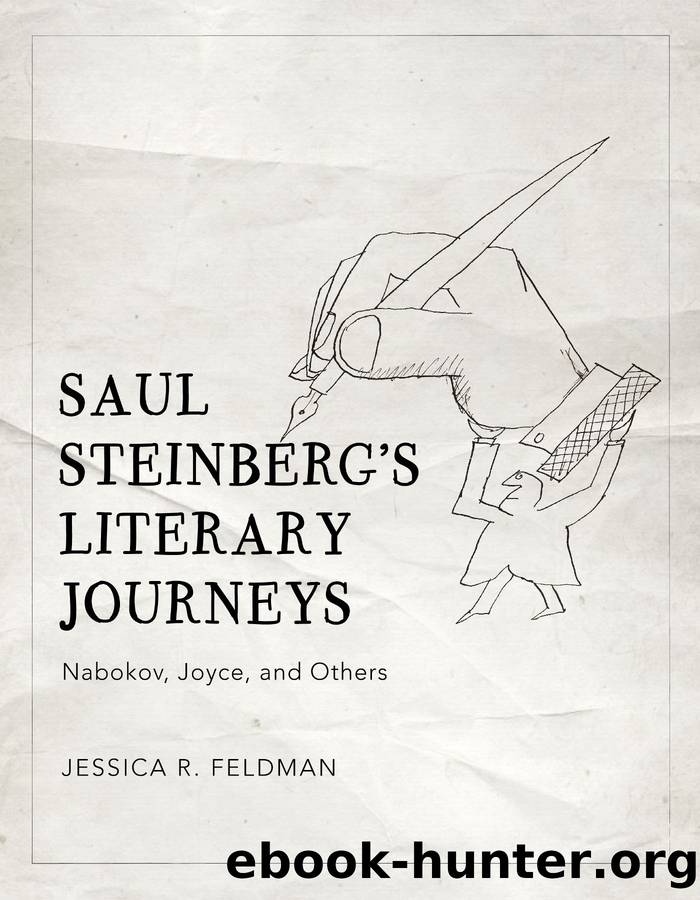Saul Steinberg's Literary Journeys by Jessica R. Feldman;

Author:Jessica R. Feldman; [Feldman, Jessica R.]
Language: eng
Format: epub
Tags: LIT020000 Literary Criticism / Comparative Literature, ART015000 Art / History / General
Publisher: Lightning Source Inc. (Tier 3)
Fig. 48. Untitled, 1971. Pencil, marker, crayon, gold and silver markers, and colored pencil on paper, 10½ à 107/8 in. (Beinecke Rare Book and Manuscript Library, Yale University)
But it is perhaps the very ambiguity of Bloomâs Jewishness that most reminds one of Steinbergâs sense of himself as a Jew. Steinberg takes his Judaism as a fact, but his responses to it range from superficial acknowledgment to painful remembrance. He may be a âmember of the tribe,â but he values his isolation from it. Across the years of his correspondence with Buzzi he mentions, for example, that the Jewish New Year falls in autumn, that Cervantes âcame from a family of conversos (Jews),â that he has called out to approaching Mormon missionaries, âYou havenât got a chance, we are Jewishâ (LAB, August 29, 1971; September 9, 1986; June 3, 1995). From 1985 onward, his comments on Judaism darken, and he writes more often of his childhood in Romania. His diploma from architecture school, the Regio Politecnico in Milan, includes the anti-Semitic phrase âof the Hebrew race,â and he sent it to Primo Levi, mentioning that its elegant typeface ârendered it even more sinisterâ (LAB, August 12, 1985). He fasts on Yom Kippur, he explains, because it is âmy way of showing respect for my tribe, but itâs for me alone, I never go to temple, in fact Iâm glad to be able to avoid it. Yet I havenât made peace with the memory of my childhood. During that period I witnessed not only national horrors but Jewish superstitions, the temple, still painful to recall. What a burden, this childhoodâ (LAB, September 29, 1990). The anti-Semites are to blame for the horrors of his early years, but Judaism also created its own troubling experiences. In the last decade of his life heâs still hoping to make peace with it. He notices that, of late, â[t]hereâs a constant exchange of insults between women, Christians, allegri (gay), Arabs, Jews, liberals etc. Thereâs a sense of rage in the air, as there was during the days of fascism, in 36 37 38, rage that wants to prove its virility. . . . The Romanians, too, always offended, low foreheads, beady little eyes gazing out beneath their eyebrows, tiny, lipless mouthsâ (LAB, March 12, 1994).
Reading a book by Alexander Stille (son of his friend Ugo Stille) entitled Benevolence and Betrayal: Five Italian Jewish Families under Fascism brings back âthe Italian Jews, the war, the intensity of those days, tragic but with the consoling happiness of being youngâ (LAB, June 19, 1995). A week later, he returns to the subject, the book eliciting detailed memories of his flight from Italy:
Download
This site does not store any files on its server. We only index and link to content provided by other sites. Please contact the content providers to delete copyright contents if any and email us, we'll remove relevant links or contents immediately.
| Ancient & Classical | Arthurian Romance |
| Beat Generation | Feminist |
| Gothic & Romantic | LGBT |
| Medieval | Modern |
| Modernism | Postmodernism |
| Renaissance | Shakespeare |
| Surrealism | Victorian |
4 3 2 1: A Novel by Paul Auster(11761)
The handmaid's tale by Margaret Atwood(7420)
Giovanni's Room by James Baldwin(6774)
Asking the Right Questions: A Guide to Critical Thinking by M. Neil Browne & Stuart M. Keeley(5335)
Big Magic: Creative Living Beyond Fear by Elizabeth Gilbert(5321)
Ego Is the Enemy by Ryan Holiday(4919)
On Writing A Memoir of the Craft by Stephen King(4647)
The Body: A Guide for Occupants by Bill Bryson(4555)
Ken Follett - World without end by Ken Follett(4426)
Bluets by Maggie Nelson(4242)
Adulting by Kelly Williams Brown(4210)
Eat That Frog! by Brian Tracy(4127)
Guilty Pleasures by Laurell K Hamilton(4095)
White Noise - A Novel by Don DeLillo(3815)
The Poetry of Pablo Neruda by Pablo Neruda(3796)
Fingerprints of the Gods by Graham Hancock(3718)
Alive: The Story of the Andes Survivors by Piers Paul Read(3713)
The Book of Joy by Dalai Lama(3668)
The Bookshop by Penelope Fitzgerald(3605)
